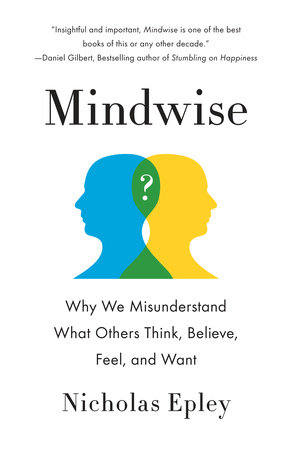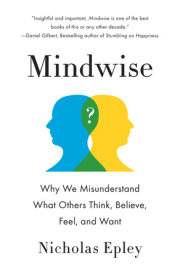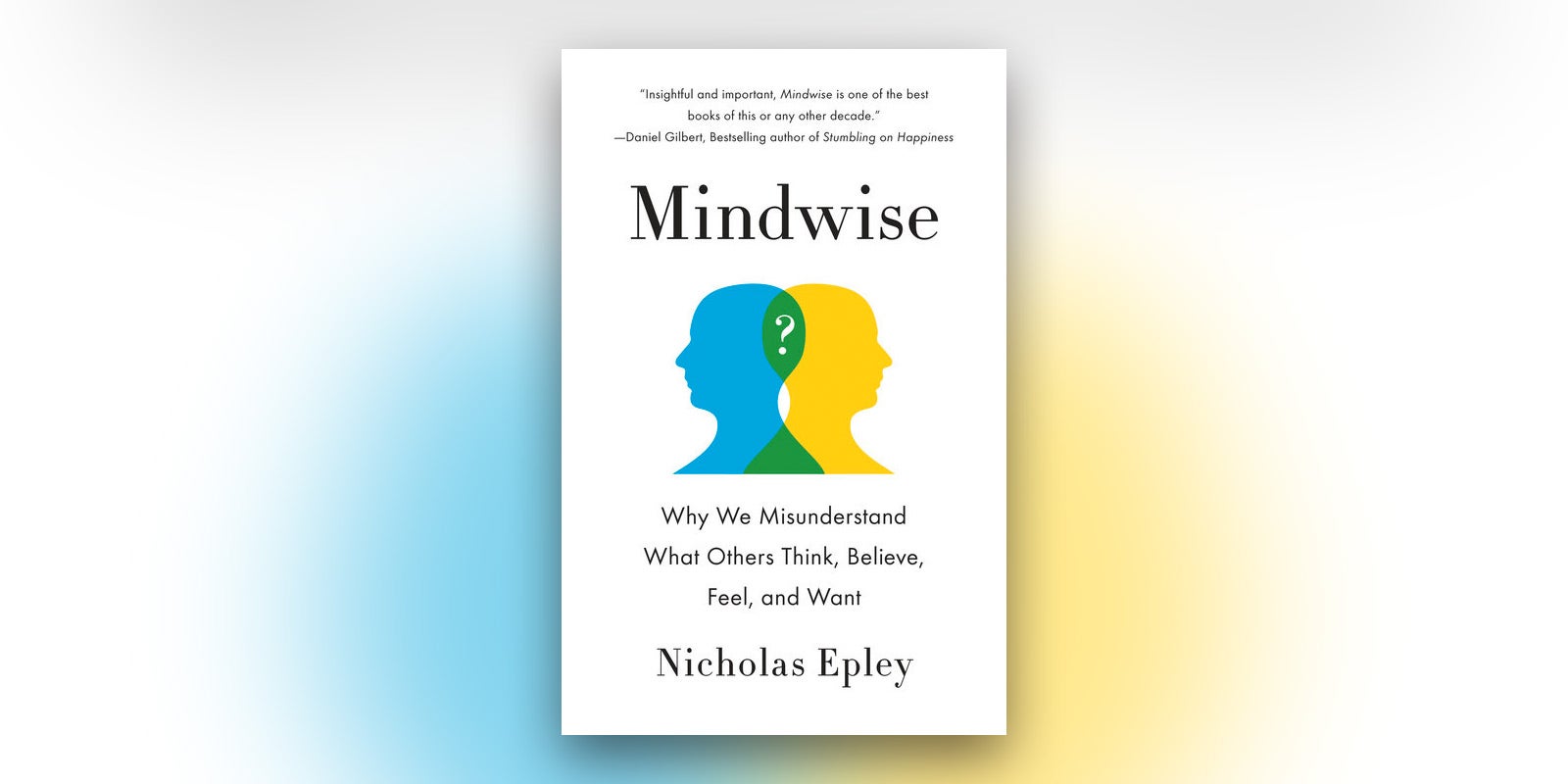1
An Overconfident Sense
A lot of leaders are coming here, to sit down and visit. I think it’s important for them to look me in the eye. Many of these leaders have the same kind of inherent ability that I’ve got, I think, and that is they can read people. I can read fear. I can read confidence. I can read resolve. And so can they—and they want to see it.
—former U.S. President George W. Bush
I’m sure you have no trouble realizing that people occasionally misunderstand each other. Such conflict keeps newspapers and divorce lawyers in business. Surely you can also think of times when others have misunderstood your thoughts, emotions, or intentions. Maybe you’ve sent a sarcastic e-mail that your coworkers took to be serious, making you look like a jerk rather than a joker? Or had earnestness mistaken for belligerence, shyness mistaken for arrogance, generosity mistaken for cynical manipulation? We’ve all been there. In your cooler moments, you probably realize that even you sometimes misinterpret and misunderstand others, including the people you should understand the best. Not often, it might seem, but at least sometimes.
More often, though, our sixth sense leaves us feeling like George W. Bush, with considerable confidence in our ability to understand others. Bush even had this clear sense after meeting Vladimir Putin for the first time: “I looked the man in the eye. I found him to be very straightforward and trustworthy. . . . I was able to get a sense of his soul.”1 Whether accurate or not, our first impressions are formed quickly and easily, and are therefore held with considerable confidence. Seeing someone for only fifty milliseconds, faster than the blink of an eye, gives us enough time to form an impression of their competence.2 These snap judgments matter. In one experiment, politicians who looked more competent than their rivals after a fleeting glance were significantly more likely to win their election (about 70 percent of the time), suggesting that those snap judgments put people into our most powerful positions.3 Your sixth sense works quickly and is not prone to second-guessing.
So just how accurately do we understand the minds of others? For many years, psychologists have been trying to answer this question by putting mind reading to the test. We might, for instance, ask you to look at pictures of people who are happy or sad, proud or ashamed, elated or afraid, to see how accurately you can recognize each emotion.
Or we might ask a group of people to tell us how much they like you, then ask you to predict how much each of these people will report liking you, and then compare your predictions with the other people’s actual rating to assess your accuracy.
How well do we perform on these tests? Are we as socially skilled as we think?
Mirror, Mirror
To get a sense of your actual abilities, let’s start with what is likely to be a very common and important bit of mind reading: trying to guess another person’s impression of you. Much of our everyday life is spent trying to understand how we’re being evaluated in order to help us create just the right impression. Does your boss think you are intelligent? Do your coworkers like you? Do your employees understand your instructions? Does your neighbor find you trustworthy? Does your spouse really love you? Or perhaps more important if you are young and single, do others think you are attractive?
In fact, knowing what others think of you appears to be one of the most common things you might want to know about the minds of others. In one survey, Mary Steffel and I asked an online sample of five hundred Americans to imagine that we had invented a “brainoscope” that would allow us to see into the minds of others. We asked our respondents to imagine that this device would allow them to know what others are thinking and feeling with perfect accuracy. We then asked our respondents to tell us who they would use their brainoscope on and what they’d want to learn about. Somewhat to our surprise, our respondents were not interested in understanding the minds of the rich, famous, or powerful. Instead, the vast majority wanted to peer into the minds of those closest to them, particularly spouses and dating partners but also bosses, family members, and neighbors. Interestingly, they wanted to get a look at the minds of those they presumably knew the best. And what our respondents wanted to find out most was what these other people thought of them. The majority wanted their brainoscope to work like a magical mirror, Narcissus 2.0.
This isn’t such a bad idea. Knowing your own reputation can be surprisingly difficult. Consider, for instance, a study that analyzed a set of published experiments all sharing the same basic design.4 In these experiments, people working in a group would be asked to predict how the other group members would rate them on a series of different traits. Researchers then compared these predicted ratings to the other group members’ actual ratings on the very same traits. The traits varied from one experiment to another and included qualities like intelligence, sense of humor, consideration, defensiveness, friendliness, and leadership ability. The groups varied in familiarity, with the members of some groups being fairly unfamiliar with one another (such as having met only once, in a job interview) and the members of other groups being very familiar with one another (such as having lived together for an extended time as roommates). If people knew exactly what others were thinking, then there would be a perfect correspondence between predicted and actual ratings. If people were clueless, then there would be no correspondence between the two. Statistically speaking, you measure relationships like these with a correlation, where perfect correspondence yields a correlation of 1 and no correspondence yields a correlation of 0. The closer the correlation is to 1, the stronger the relationship.
First, the good news. These experiments suggested that people are pretty good, overall, at guessing how a group of others would evaluate them, on average. The overall correlation in these experiments between predicted impressions and the average actual impression of the group was quite high (.55, if you are quantitatively inclined). To put that in perspective, this is roughly the same magnitude as the correlation between the heights of fathers and the heights of sons (around .5). It is not perfect insight, but it is also very far from being clueless. In other words, you probably have a decent sense of what others generally think of you, on average.
Now the bad news. These experiments also assessed how well people could predict the impression of any single individual within a given group. You may know, for instance, that your coworkers in general think you are rather smart, but those coworkers also vary in their impression of you. Some think you are as sharp as a knife. Others think you are as sharp as a spoon. Do you know the difference?
Evidently, no. The accuracy rate across these experiments was barely better than random guessing (an overall correlation of .13 between predicted and actual evaluations, only slightly higher than no relationship whatsoever). Although you might have some sense of how smart your coworkers think you are, you appear to have no clue about which coworkers in particular find you smart and which do not. As one author of the study writes, “People seem to have just a tiny glimmer of insight into how they are uniquely viewed by particular other people.”5
But perhaps this is holding your mind-reading abilities to too high a standard? It’s hard, after all, to define traits like intelligence and trustworthiness precisely, so it might not be so surprising that we have difficulty guessing how others will evaluate us on these ambiguous traits. What about predicting something simpler, such as how much other people like you? Surely you are better at this. You learn over time to hang around people who smile at you and avoid those who spit at you. You must have a much better sense of who likes you and who hates you within a group. Yes?
I’m afraid not. These studies found that people are only slightly better than chance at guessing who in a group likes them and who does not (the average correlation here was a meager .18). Some of your coworkers like you and others do not, but I wouldn’t count on you knowing the difference. The same barely-better-than-guessing accuracy is also found in experiments investigating how well speed daters can assess who wants to date them and who does not, how well job candidates can judge which interviewers were impressed by them and which were not, and even how well teachers can predict their course evaluations. Granted, it’s rare that you are completely clueless about how you are evaluated. Accuracy tends to be better than chance in these experiments, but not necessarily by very much.
Perhaps, though, getting these broad and general evaluations right is still too much to expect of your sixth sense. What if we tried something simpler still, something specific and concrete that you’ve likely spent a considerable amount of time thinking and learning about? Can you accurately predict how attractive a member of the opposite sex will find you after being shown a photograph of you? You have, after all, lived a full life with yourself, looking at your face in the mirror every morning, and getting a sense of whether people tend to find you attractive or not. At certain points in your life (perhaps you’re at that point right now), you may have thought of little else. And yet when Tal Eyal and I ran a series of experiments in which we asked people to predict how attractive they would be rated by a member of the opposite sex who was evaluating a photograph we took of them, we found that people’s predictions were no more accurate than chance guessing.6 Across two different experiments, the overall correlation between predicted and actual evaluations was 0. It’s not that our volunteers consistently thought they were more attractive than they were actually rated, but that their predictions of how attractive they would be considered from a single photograph simply bore no relation to how they were actually rated on the basis of that photograph. It is often said that love is blind, but our participants did not even have a chance to be blinded by any love. They were just blind to begin with.
The central challenge for your sixth sense is that others’ inner thoughts are revealed only through the façade of their faces, bodies, and language. Just as human beings have evolved the ability to use cues from that façade to see what truly lies beneath—to be mind readers—so, too, have human beings developed a skill to use their façade to mislead and misdirect others—to be liars and deceivers. Anyone who has ever been on the receiving end of “Does my butt look big in these pants?” knows that what you say to someone does not always reflect what you truly believe about them. And yet, time and time again, researchers have found that our attempts to guess when another person is telling the truth and when they are lying are just that: little better than guesses. When George W. Bush met Vladimir Putin, he felt like he had learned a great deal about the inner “soul” of this former KGB agent by reading his behavior. I wouldn’t bet on it. When one group of researchers evaluated decades of studies and hundreds of experiments that measured how well people could distinguish truths from lies, they found that people’s ability to spot deception was only a few percentage points better than a random coin flip: people were 54 percent accurate overall, when random guessing would make you accurate 50 percent of the time.7
These mistakes are no laughing matter. At times, they can have deadly serious consequences. Neville Chamberlain, as the prime minister of Great Britain, believed Adolf Hitler’s assurance in 1938 that peace could be preserved with Czechoslovakia and thus encouraged the Czechs not to mobilize their army. “In spite of the hardness and ruthlessness I thought I saw in his face, I got the impression that here was a man who could be relied upon when he had given his word,” Chamberlain said. He was wrong. Hitler was actually lying, having already mobilized his army to attack Czechoslovakia and needing to buy just a little more time to ensure a crushing invasion. Nearly seventy years later, American officials had learned not to trust scoundrels. They were therefore certain that Saddam Hussein was lying when he said, time and again, that he had no weapons of mass destruction. But again, like the majority of American people at the time, they were wrong.8 Americans went to war, mistakenly believing that Hussein was lying when he was actually telling the truth. It’s easy to see how understanding other people can be a daunting task if you are unable to tell when they are misleading you and when they are not.
Illusions of Insight
Although it may be challenging, perhaps reading the minds of others still isn’t very much of a problem in everyday life because our mind reading is finely tuned to those we know the best, such as our closest friends, relatives, colleagues, and spouses. Long-married spouses sometimes say they know each other so well that they can complete each other’s sentences. Really getting to know someone puts you in sync with them, you might think, so you’re able to understand each other’s thoughts without even uttering a single word. There is no doubt that friends, coworkers, and romantic partners think they know each other’s minds better than they know the minds of strangers. Is this confidence justified? Do we really know our friends and loved ones as well as we believe we do?
Again, the answer is no, but this answer comes in two parts. The first part is that you are indeed better able to read the minds of close friends and loved ones than those of strangers, although not by all that much. William Ickes, a pioneer in research on mind-reading accuracy, points out that in his experiments, “strangers read each other with an average accuracy rate of 20 percent” when videotaped and later asked to report their moment-by-moment thoughts and feelings.9 “Close friends and married couples,” he reports, “nudge that up to 35 percent.” So yes, you do know what your spouse or a close friend likes and dislikes more than a random stranger would, but the gain may be surprisingly modest. The second part of this answer, however, is that the confidence you have in knowing the mind of a close friend or romantic partner far outstrips your actual accuracy. Getting to know someone, even over a lifetime of marriage, creates an illusion of insight that far surpasses actual insight.10
Copyright © 2014 by Nicholas Epley. All rights reserved. No part of this excerpt may be reproduced or reprinted without permission in writing from the publisher.






